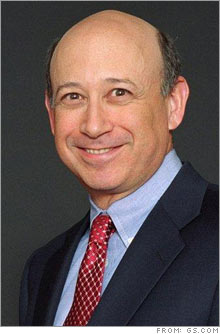Goldman is going strongGoldman Sachs is soaring on record revenues and earnings. The blistering pace may slow, but the long-term outlook remains bright, says Fortune's Yuval Rosenberg.(Fortune Magazine) -- On Wall Street there's good and then there's Goldman. Widely considered the best of the bulge-bracket investment firms, Goldman Sachs was the sole member of the securities industry to make our 2006 list of America's Most Admired Companies (it placed 18th). The bank has long had a reputation for attracting the best and the brightest - and no wonder: Goldman made headlines in December for doling out an extraordinary $16.5 billion in compensation last year. That works out to an average of nearly $622,000 for each employee. (CEO Lloyd Blankfein, who took over in June when Henry Paulson left to become Treasury Secretary, was awarded a mammoth $53.4 million bonus, an industry record.)
In the months since our list came out, Goldman's glittering reputation has only gotten brighter. Given a healthy bull market, along with a boom in dealmaking and hedge fund trading, investment banks such as Bear Stearns (Charts), Lehman Brothers (Charts) and Morgan Stanley (Charts) enjoyed their best year ever. But Goldman Sachs trumped them all. Profits jumped 70 percent, to $9.54 billion - the biggest ever for a Wall Street firm - on revenues that increased 49 percent, to nearly $38 billion. "They're working with a huge capital base, and they're really doing a lot better with their investments than a lot of their competitors," says Standard & Poor's equity analyst Matthew Albrecht. Goldman Sachs (Charts) stock, meanwhile, rocketed 56 percent in 2006, more than three times the gain of the S&P 500, adding over $30 billion to the firm's market valuation. Can that remarkable performance continue in 2007? While profits are unlikely to soar by 70 percent - and the stock is unlikely to zoom another 50 percent - the pipeline of deals and stock offerings looks healthy through the first months of the year, analysts say. More important, global economic growth and Goldman's strategic moves should continue to pay off. The development of international markets has opened new frontiers for rapid growth. In addition, the explosive expansion of proprietary trading operations, hedge funds and private equity has given Goldman new avenues for profit making and helped boost margins. "The restructuring of the world's financial system is playing right into Goldman's strengths, and therefore, ultimately, this company's earnings should be extraordinarily strong," says analyst Richard X. Bove of Punk Ziegel. Those fundamental changes are spurring investors to award Goldman (and its rivals) higher valuations than in the past - and that trend may continue. "I don't think that the valuations of these stocks reflect the secular change in the quality of the businesses," says Ken Heebner, manager of the CGM family of mutual funds, who loaded a couple of his portfolios with brokerage stocks in the latter half of 2006. That doesn't mean there won't be bumps along the way, though. Analysts, on average, expect earnings per share to decline slightly this year. And Goldman's results remain inextricably linked to the overall health of the global economy and markets. "There's a very strong case for [upward] multiple revaluation," says Heebner. "But if there's a problem and we see a big market decline, that case evaporates." ___________________ |
Sponsors
|


